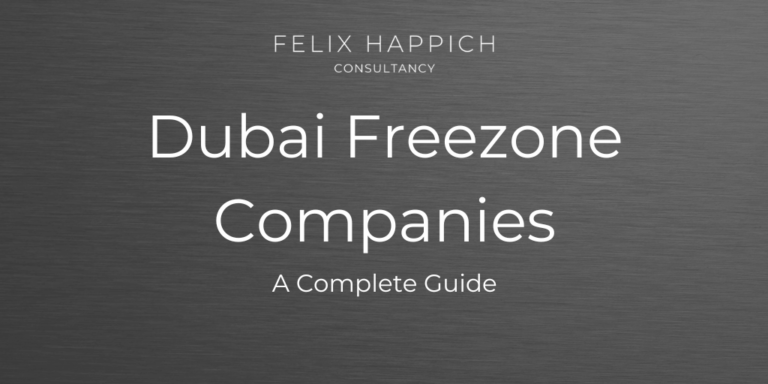Dubai mainland represents the economic jurisdiction, regulated by the Department of Economic Development (DED), allowing businesses to sell their products to the domestic and international markets. The corporate tax rate in Dubai mainland is 0% for businesses earning less than 375,000 AED in annual profits or less than 3 million AED in yearly revenue as per Federal Decree-Law No. 47 of 2022. Businesses with income exceeding the 375,000 AED threshold are charged a 9% corporate tax on incremental income as per Article 3 of the governing law. However, corporate tax exemptions apply to companies specified in Article 4, including extractive businesses, non-extractive natural resource businesses, qualifying investment funds, and more.
Other than corporate tax, businesses must pay value-added tax at 5% of the total value of their supplies as per Article 3 of Federal Decree-Law No. 8 of 2017. Nonetheless, VAT exemptions are applicable on exports, international transport, international carriage, and precious investment materials as per Article 45 of the Decree-Law.
Similarly, businesses incur additional costs in municipal and property taxes, labeled as ‘market fees’ for commercial locations. The fee is 5% of the annual rental value calculated by the Department of Economy and Tourism with every license renewal.
Additionally, businesses involved in imports of supplies are also liable to pay customs duties at 5% of the CIF (Cost, insurance, and freight) as per Dubai Customs; however, businesses importing alcohol and cigarettes have to pay customs duties of 50% and 100% of the CIF of their consignment respectively.
Nonetheless, Dubai’s corporate tax code offers multiple tax benefits for small businesses and businesses in specific sectors. Hence, tax optimization is crucial for companies to identify exempted activities, leverage tax deductions, and save tax expenses. In this guide, we will take you through the various forms of taxes levied on businesses on the mainland of Dubai and how they are calculated. Let’s go!
What taxes do companies pay in Dubai Mainland?
Companies in Dubai mainland are liable to pay taxes as per Federal Decree-Law No. 47 of 2022. Businesses earning a taxable income of less than 375000 AED, or USD 102,000, have a tax rate of 0%. The threshold of 375,000 was set in Cabinet of Ministers Decision No. 116 of 2022. Businesses earning a taxable income higher than the established threshold, i.e., 375000 AED, will incur a 9% tax rate on the incremental income as per Article 3.
Alongside the corporate tax, indirect taxes, such as the VAT, are also imposed on businesses governed by Federal Decree-Law No. 8 of 2017. The standard VAT rate is set at 5%, applicable to most goods and services supplied or imported within the UAE. However, the law specifies exemptions and zero-rated supplies, including exported goods and services, international transport completed within the state, and Air passenger transport in the State if it is considered an “international carriage”, as per Article 45.
Another additional tax for mainland business is the “Excise tax”, which is levied on the production of specific goods. These products primarily include products considered harmful to human health and the environment, including tobacco, carbonated drinks, and energy drinks, per Article 2 of Cabinet Decision No. 52 of 2019. The tax rates for different excise goods vary depending on their harm; for instance, 100% of the retail price as excise tax is levied on tobacco products, but only 50% is levied on sweetened drinks as per Article 12 of Cabinet Decision No. 52 of 2019.
Federal Corporate Tax (FCT)
Federal corporate tax is the tax payable by the business on the profit generated by its operations in a year. The tax rate for Dubai mainland businesses is set at 9% for profits exceeding 375000 as per Article 3 of Federal Decree-Law No. 47 of 2022; firms with a net income less than 375000 are exempt from the tax.
Similarly, Article 4 specifies businesses that are also exempt from corporate taxation in Dubai mainland, including extractive businesses, Non-Extractive Natural Resource Businesses, Qualifying Investment Funds and Qualifying Public Benefit Entity. Moreover, the Ministry of Finance also provides “small business relief” from corporate tax for businesses whose annual revenue doesn’t exceed 3 million in current or previous tax periods, as per Article 21 of the law.
How does corporate tax apply to a company in Dubai Mainland?
The corporate tax rate applies to a company’s taxable income determined by its standalone (unconsolidated) financial statements prepared according to the reporting framework accepted in Dubai, as per Article 20 of Federal Decree-Law No. 47 of 2022.
Adjustments are, however, made to the reported profit to account for income exempt from tax, unrealized gain or loss, and deductions allowed as per Chapter Nine of the federal law, including interest expenses, up to 30% of the company’s EBITDA, and up to 50% of entertainment expenses incurred for business. The effective time for a corporate tax rate is specified as the Gregorian calendar year, or the 12-month period for which the entity creates its financial statements as per Article 57.
What is the corporate tax rate for a company in the Dubai Mainland?
The corporate tax rate for Dubai mainland companies is 9% on incremental income of businesses beyond 375000 AED as per Article 3 of Federal Decree-Law No. 47 of 2022. Businesses earning below 375,000 in annual profits or 3 million in annual revenue are exempt from the tax under the small business relief program.
Do Mainland companies pay tax?
Dubai Mainland companies are liable to pay 9% of their annual income above 375,000 AED as corporate tax to the Emirates government; however, some businesses are exempted from corporate taxes, such as those earning under the income threshold or operating in specific activities as per Article 4, such as public entities, public pension or social security fund, and public benefit entities.
Value-Added Tax (VAT)
Value-added Tax refers to the tax on consumption levied at each step in the supply chain and is ultimately borne by the customer. It is an indirect tax collected by the registered businesses at each supply chain step on behalf of the federal tax authority. The Federal tax system differentiates between taxes subject to profit and value-added tax by specifying it as a tax based on consumption rather than a threshold profit.
Dubai mainland levies a 5% Value-added tax on prices of “every taxable supply and deemed supply made by a taxable person” and the import of concerned goods as per Article 2 of Federal Decree-Law No. 8 of 2017. However, some goods and services are exempted (0% VAT) from value-added tax as per Article 45 and are listed below.
- Exports: Direct or indirect export of goods and services to outside the implementing states
- International Transport: International transport of passengers and goods, including transport-related services
- Certain Means of Transport: Supply or import of air, sea, and land means of transport for transporting passengers and goods
- Investment Precious Metals: Supply or import of investment precious metals.
- First Supply of Residential Buildings: Within 3 years of completion
- Educational Services: Supply of educational services and related goods and services for certain educational institutions
- Healthcare Services: Supply of preventive and basic healthcare services and associated goods and services.
What is Value-Added Tax in Dubai Mainland?
Value-Added Tax (VAT) in Dubai Mainland is a consumption tax imposed on the import and supply of goods and services at each stage of production and distribution, including deemed supplies, as per Federal Decree-Law No. 8 of 2017. The purpose of VAT is to generate revenue for the government by taxing the value added to goods and services at each stage of the supply chain, ultimately borne by the end consumer.
How does Value-Added Tax (VAT) apply to a company in Dubai Mainland?
Value-added Tax applies at the rate of 5% on taxable and deemed supplies at each step of the supply chain as Article 3 of Federal Decree-Law No. 8 of 2017. For example, consider a company that deals in electronic gadgets. If this company purchases gadgets for AED 100,000 and sells them for AED 150,000, the VAT will be applied both at the purchase and sale.
The company pays an Input VAT of 5% on its purchase, amounting to AED 5,000. When selling the gadgets, it charges an Output VAT of 5% on the selling price, totalling AED 7,500. The company is then required to pay the difference between the Output VAT and Input VAT to the government, which in this case is AED 2,500 (AED 7,500 – AED 5,000).
It eventually means the company’s profit before VAT is AED 50,000, but after accounting for the VAT payable, the profit is reduced to AED 47,500. However, the VAT calculations will vary for businesses importing their production items from other states where tax rates differ; in such cases, they are allowed to treat the complete tax paid as recoverable input tax per Article 54.
What is the Value-Added Tax (VAT) rate for a company in the Dubai Mainland?
The Value-Added Tax (VAT) rate for a company in the Dubai Mainland is 5%, as specified in Federal Decree-Law No. 8 of 2017. The tax rate is applied at each step of the supply chain, where the consumer bears the final tax burden. Businesses in the supply chain are only supposed to pay the net tax after deducting the recoverable input tax.
Do a Mainland company pay Value-Added Tax (VAT)?
Yes, a Mainland company in Dubai is required to pay the net Value-Added Tax (VAT) at 5% of its total supply as per Article 2 of Federal Decree-Law No. 8 of 2017.
Which companies are exempted from VAT?
Dubai mainland Companies exempted from VAT are specified in Article 45 of Federal Decree-Law No. 8 of 2017 and include companies involved in the export of goods and services, international transport of passengers and goods, supply or import of investment precious metals, such as gold, silver, and platinum. Moreover, Amendments to Article 46 as per Federal Decree-Law No. 18 of 2022 have also exempted the Supply of financial services, residential buildings through sale or lease, and bare land.
Municipal Taxes
Municipal taxes refer to taxes levied by the local government on businesses in Dubai mainland. Businesses are supposed to pay 5% of their annual rental value of commercial units as the property tax, aka the market fees, as per Dubai municipality. However, the fees rise to 15% of the rental value for banks and are subject to hotel rooms and ratings in the case of hotel establishments.
The Department of Economy and Tourism calculates the market fees at the time of license renewal. Nonetheless, if a business operates under multiple licenses, the fee should be paid only once, as per Dubai municipality. However, in cases of private property, such as those where the owner is the tenant on a leased property or investment plots, the market fees are calculated based on the index issued by the Real Estate Regulatory Agency (RERA).
Customs Duties
Customs duties are taxes levied on imported goods on the ad-valorem basis, or more simply, the estimated value of the imports. The custom tax rate is set at 5% of the CIF (cost, insurance, and freight) as per the government of Dubai. However, a 50% rate is applied to the import of alcohol and 100% to the import of cigarettes. Nonetheless, machinery, equipment, spare parts, and building materials required for industrial purposes are exempted from customs taxes as per the Industrial Development Bureau.
Businesses and individuals should submit a customs declaration to import, export, or transfer goods from and out of Dubai; the required documents include an invoice, certificate of origin, packing list, and Permit from restriction entities. The submission and approval take around 2 hours, as per Dubai customs. The fee for custom declaration is AED 15 to 100 for imports and exports, with an Additional 20 AED charged as a knowledge and innovation fee over 50 AED charge.
Other Taxes
Other taxes include taxes other than corporate, value-added, municipal, and customs taxes. It primarily comprises taxes on specific industries, such as Tourism and Entertainment. The Department of Tourism and Commerce Marketing issued resolution No. 2 of 2020 imposing a tourism dirham fee on hotel establishments based on the overnight stays of the guests. The Dirham fee will depend on the hotel classification specified by Schedule 1 of the resolution.
Similarly, businesses operating in strategic industries, such as telecommunication, banking, and defense, may also incur additional costs in licensing and approvals required to operate their businesses in Dubai mainland. The additional approval cost varies based on activity, legal structure, and partners’ residence.
Do I need to consult with a tax professional before setting up a business in the Dubai Mainland?
Yes, a tax consultant can help you set up a business in the Dubai mainland. They can help you understand the taxes applicable to particular business activities, the exemptions available for new and small businesses, and how to save and file taxes. Their expertise in Dubai mainland will help you avoid legal hurdles in your business’s growth.






